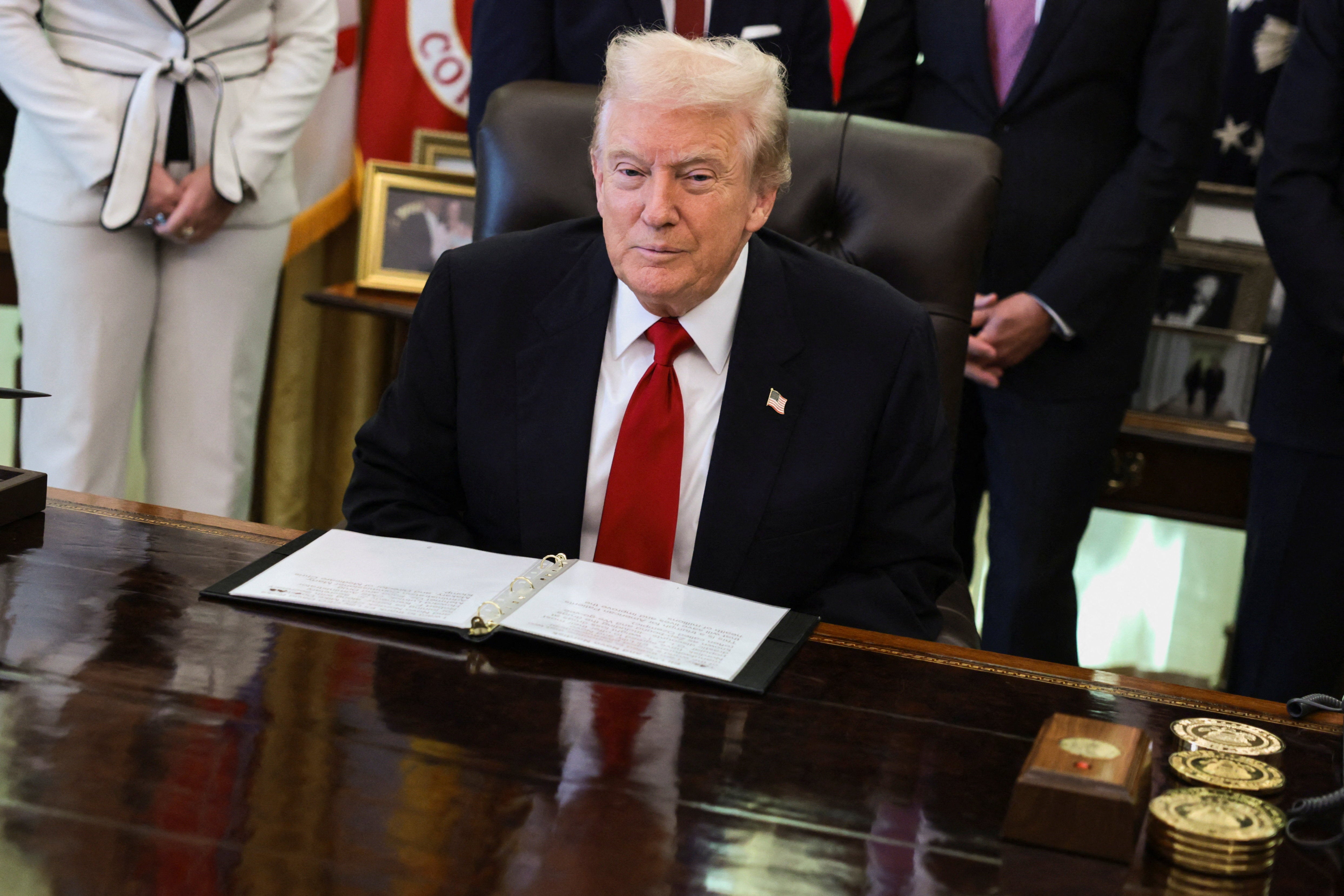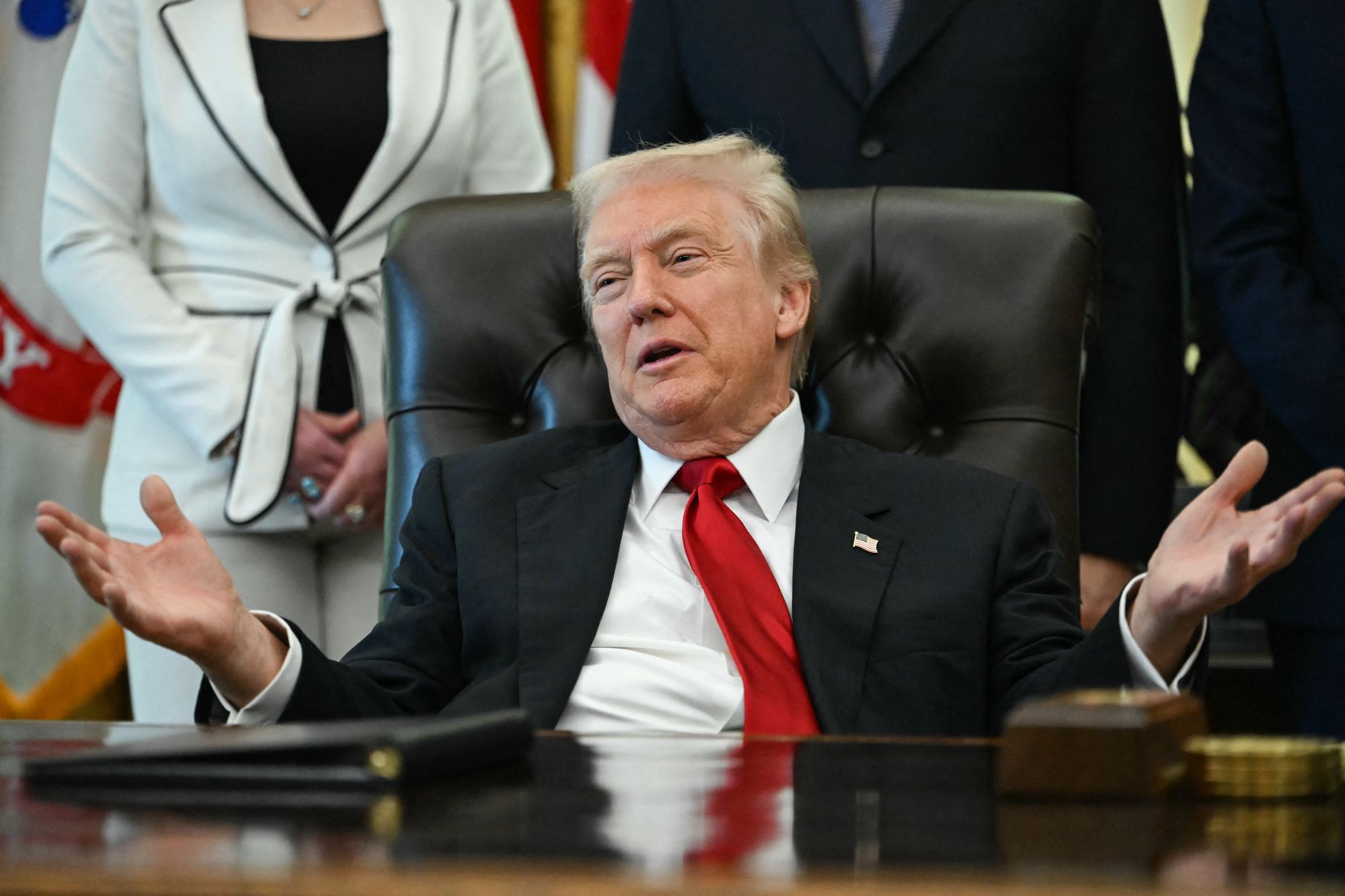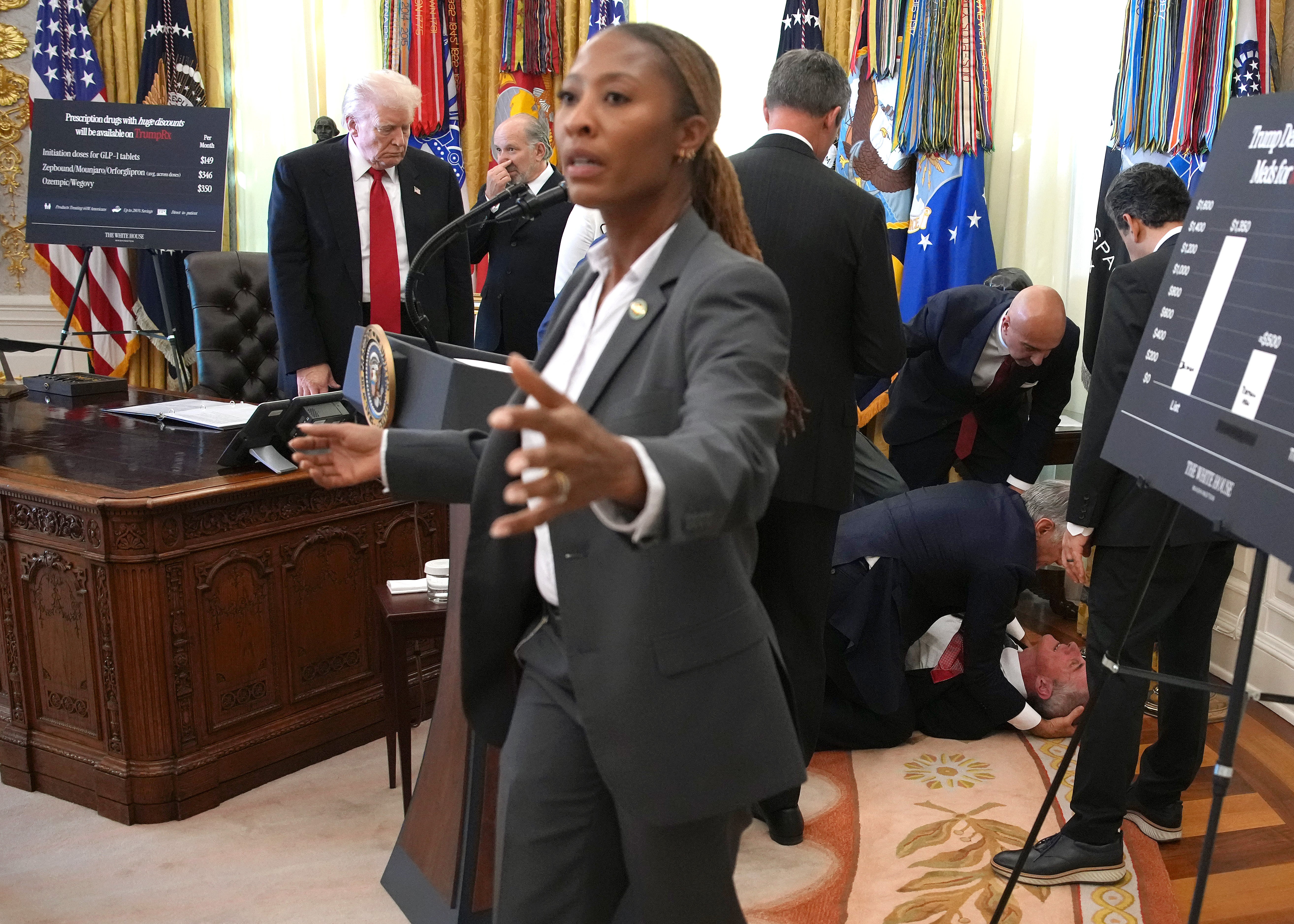The Trump administration has reached a deal with two drug makers to lower prices of popular GLP-1 diabetes medications for Americans on Medicare and Medicaid as well as for those who purchase the drugs on the administration’s forthcoming TrumpRx web site.
The deal will also see Medicare and Medicaid expand coverage for the medications to permit Americans with certain medical conditions or a body mass index above certain thresholds to receive the injections as treatments for obesity and other serious conditions.
Speaking in the Oval Office Thursday, Trump said he was “thrilled” to announce “tremendous cuts” and “drastic discounts” for the “very effective drugs,” which he referred to as “the fat drugs” and remarked that he’d “never heard anything bad” about the wildly popular medications.
“It's a triumph for American patients that will save lives and improve the health of millions and millions of Americans,” he said.
However, Trump’s announcement was interrupted when an official behind him passed out in the middle of the comments. The White House later said the person was OK.

Trump said GLP-1 makers Eli Lilly and Novo Nordisk were “joining the phenomenal list” of drug companies that have capitulated to his administration’s demand that they offer their products on a “most-favored nation” pricing plan, bringing the cost Americans pay for their drugs down to a level on par with countries that pay lower prices through their single-payer health care systems.
For example, Trump said the cost of Wegovy would drop under the plan from $1,350 per month to $250 per month, with Zepbound dropping from $1,080 to $346. Once approved, Eli Lilly’s weight-loss pill will be available for $149.
He then asked: “Did I do a good job?”
Trump also said both companies had agreed to offer their entire catalogues at “deeply discounted prices” on the TrumpRx website, which could be running by the end of this year.
All new medications offered by both companies will also be offered at “most-favored nation” prices, he aded.
Health and Human Services Secretary Robert F. Kennedy Jr., who had previously expressed opposition to the use of GLP-1 drugs to combat obesity, praised Trump’s efforts to lower the costs for the anti-obesity medications and noted that the medications were “not a panacea” while predicting that their wider availability would impact rates of obesity, diabetes and heart disease in the U.S.
“We are going to see a decline because of this historic agreement, we're going to see a decline in cost, but also, more importantly, in the afflictions themselves,” Kennedy said.
The HHS secretary also noted that wider availability of the medications would cause the American public to collectively lose 125 million pounds by this time next year.
“It will allow a lot of people who are locked into high-risk obesity to finally lose weight, to reset and then start doing the kind of things that will address the root causes of obesity,” he said.
Minutes later, CMS administrator Mehmet Oz, the ex-television personality who was once a celebrated heart surgeon, proclaimed that the real amount of collectively lost weight by next year could be “135 billion pounds.”
“But I don’t measure it in pounds. I measure it in saved lives,” Oz said.
The event was cut short a few moments after that when an attendee began to collapse as Oz went to his aid.
Reporters were ushered out of the room quickly thereafter, and White House Press Secretary Karoline Leavitt said in a statement that the “gentleman” was “okay” and under the care of the White House Medical Unit.

A senior administration official who briefed reporters on the announcement said the cost of oral GLP-1 medications such as Novo Nordisk’s Rybelsus will fall to just $149 per month for Medicare, Medicaid and TrumpRx patients, while the price for injectable GLP-1 medications such as Ozempic/Wegovy or Mounjaro/Zepbound will drop to $245 per month for patients using it to treat diabetes and other disorders that are currently covered.
The official also said the cost savings Medicare will achieve as a result of the lower prices will be re-directed into providing coverage for patients suffering from “obesity, high metabolic or cardiovascular risk” to acquire GLP-1 medications at the same $245-per-month cost.
Currently, only patients with diabetes and similar conditions can have GLP-1 medications covered under Medicare, but the official said the expanded coverage will allow the medications to be prescribed for “patients who are overweight, with pre-diabetes or established cardiovascular disease,” as well as ‘patients with obesity and uncontrolled hypertension, kidney disease, [or] heart failure” with a Body Mass Index greater than 27.
Additionally, patients with a BMI over 35 — an indicator of severe obesity — will be able to have access to GLP-1 medications as well, with all three groups being eligible “for purposes of obesity and for driving benefit across cardio metabolic improvement.”
“What this means is that patients struggling with these can now access these life-changing treatments affordably, and by that, we specifically mean Medicare patients will only pay a copay of $50 for any approved indication,” the official said, adding that Medicaid programs in all 50 states will also be able to opt-in to the same pricing scheme.
Patients who purchase the medications through TrumpRx — which the administration plans to launch early next year — will first be able to buy the medications “at or below $350” for a month’s supply, with that price “trending down” to roughly $245 over a two-year period.
“This isn't just about losing weight. This is about getting fitter. It's about getting healthier. And we believe there are tens of billions of dollars of additional savings beyond the fact that this is already a nearly cost neutral deal to improve health of the nation,” the official said.
“This is about making America healthy again. This is about preventing strokes, this is about preventing heart attacks, and this is about preventing end stage renal disease.”
A second official said the new prices and eligibility criteria would impact approximately ten percent of Medicare-eligible population.

Currently, millions of Americans utilize weight-loss drugs, making them some of the most popular — and profitable — medications currently on the market. Some recent health surveys suggest as many as 12 percent of adults have used GLP-1s at some point.
People in the United States pay three times more for prescription medications than other countries in the Organization for Economic Cooperation and Development pay.
This is in part because the American government does not regulate drug prices for the most part, giving manufacturers free rein to set their own prices at different levels for various insurers and out-of-pocket payers. Additionally, America’s lack of a single-payer health care system means prices can vary widely for patients depending on their particular health insurance plan.
Trump has attempted to combat this by way of a series of executive orders aiming to reduce drug costs for people in the U.S. through his “most favored nation” policy, which intends to lower prices by 59 percent or more.
He has also threatened 100 percent tariffs on pharmaceutical companies unless they build manufacturing plants in the U.S.
While manufacturers fought his “most favored nation” plan after he signed a similar order during his first term, since he returned to office the same companies have largely capitulated to his wishes.
Earlier this year, Trump announced deals with drug makers Pfizer, AstraZeneca and EMD Serono to make their products available on TrumpRx and invest billions into the U.S. for research and development.
While the Biden administration had proposed a rule in November 2024 in an attempt to allow Medicare and Medicaid to cover weight-loss drugs, the Trump administration rejected the proposal shortly after Trump was sworn in for a second term this past January.
A senior administration official characterized the Biden administration initiative as “an attempt” to “give big pharma a big gift” while the outgoing administration was “on the way out” by not including any price concessions in the plan, which he said would have cost taxpayers as much as $40 billion per year.
“When President Trump came in, he said, ‘hold up, we need to get a better deal,’ and that's what we have to announce today,” the official said.







